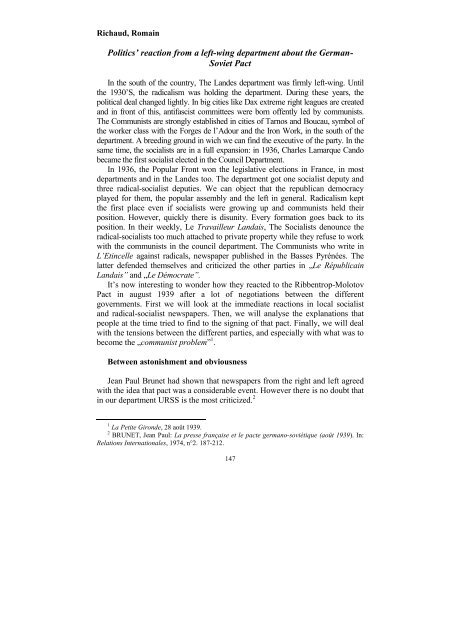The Molotov-Ribbentrop Pact - ELTE BTK Történelem Szakos Portál
The Molotov-Ribbentrop Pact - ELTE BTK Történelem Szakos Portál
The Molotov-Ribbentrop Pact - ELTE BTK Történelem Szakos Portál
You also want an ePaper? Increase the reach of your titles
YUMPU automatically turns print PDFs into web optimized ePapers that Google loves.
Richaud, Romain<br />
Politics’ reaction from a left-wing department about the German-<br />
Soviet <strong>Pact</strong><br />
In the south of the country, <strong>The</strong> Landes department was firmly left-wing. Until<br />
the 1930’S, the radicalism was holding the department. During these years, the<br />
political deal changed lightly. In big cities like Dax extreme right leagues are created<br />
and in front of this, antifascist committees were born offently led by communists.<br />
<strong>The</strong> Communists are strongly established in cities of Tarnos and Boucau, symbol of<br />
the worker class with the Forges de l’Adour and the Iron Work, in the south of the<br />
department. A breeding ground in wich we can find the executive of the party. In the<br />
same time, the socialists are in a full expansion: in 1936, Charles Lamarque Cando<br />
became the first socialist elected in the Council Department.<br />
In 1936, the Popular Front won the legislative elections in France, in most<br />
departments and in the Landes too. <strong>The</strong> department got one socialist deputy and<br />
three radical-socialist deputies. We can object that the republican democracy<br />
played for them, the popular assembly and the left in general. Radicalism kept<br />
the first place even if socialists were growing up and communists held their<br />
position. However, quickly there is disunity. Every formation goes back to its<br />
position. In their weekly, Le Travailleur Landais, <strong>The</strong> Socialists denounce the<br />
radical-socialists too much attached to private property while they refuse to work<br />
with the communists in the council department. <strong>The</strong> Communists who write in<br />
L’Etincelle against radicals, newspaper published in the Basses Pyrénées. <strong>The</strong><br />
latter defended themselves and criticized the other parties in „Le Républicain<br />
Landais” and „Le Démocrate”.<br />
It’s now interesting to wonder how they reacted to the <strong>Ribbentrop</strong>-<strong>Molotov</strong><br />
<strong>Pact</strong> in august 1939 after a lot of negotiations between the different<br />
governments. First we will look at the immediate reactions in local socialist<br />
and radical-socialist newspapers. <strong>The</strong>n, we will analyse the explanations that<br />
people at the time tried to find to the signing of that pact. Finally, we will deal<br />
with the tensions between the different parties, and especially with what was to<br />
become the „communist problem” 1 .<br />
Between astonishment and obviousness<br />
Jean Paul Brunet had shown that newspapers from the right and left agreed<br />
with the idea that pact was a considerable event. However there is no doubt that<br />
in our department URSS is the most criticized. 2<br />
1 La Petite Gironde, 28 août 1939.<br />
2 BRUNET, Jean Paul: La presse française et le pacte germano-soviétique (août 1939). In:<br />
Relations Internationales, 1974, n°2. 187-212.<br />
147













